[Editor’s note: Reprinted from the Freethinker, 28 March 1970, pp. 100 – 101. Images of the article as originally published appear at the end. Some organisations have changed their names since this was written. The BHA is now Humanists UK; the RPA, the Rationalist Association; South Place Ethical Society, Conway Hall Ethical Society; the National Council for Civil Liberties, Liberty.]
One of the curious facts of history, especially since the Second World War, is how (to the presumptive embarrassment of Fundamentalists) “houses divided” (several nation states and famous families) have managed not only to stand up, but often do so with considerable success. For this reason I have chosen the above title for an article on the structure of the Humanist/Rationalist1 movement in Britain. Before going any further I must apologise firstly for excluding the Irish movement from this essay, for reasons of simplicity (Ireland is a “special case”); and secondly for the long list of footnotes, which I have appended separately to avoid too many digressions in the main text.
Many newcomers to this movement are at first bewildered by the mystical trinity of abbreviations — BHA, NSS and RPA — into which it is divided at the national level. He or she eventually finds out that these are the names of the main national organisations, the British Humanist Association,2 National Secular Society3 and Rationalist Press Association Ltd.4 Later on, the newcomer will come across another London-based body of quasi-national importance, South Place Ethical Society,5 known as SPES or “South Place” (or sometimes “Conway Hall”). Having worked out what all the abbreviations stand for, one can sympathise with the new member for asking, “Why so many organisations for the same thing? Why on earth don’t they all unite or something?”
I must confess that, in my own case, I was never much bothered by this phenomenon of division when I first joined the movement (around 1963), perhaps because I have a sense of history and suspected that the various organisations had arisen as a result of different circumstances in the past; but the fact still remains that many new members do wonder why there is not now just one national Humanist society, and not only newcomers: in the last few years a number of leading Humanists have advocated a unified movement at the national level. For this reason, in particular, I venture into print in order to represent the opposing case; I contend that the present arrangement serves the cause of Rationalism as a whole (at least potentially) far better than a single monolithic structure.
To begin with, unity is not practicable for legal reasons as the law now stands. A few years ago the RPA had to break off its affaire du coeur with the old Ethical Union as the RPA had become an educational charity (which precluded it from political campaigning) and a court ruled that the Ethical Union’s aims and objects were not charitable in law. The two bodies had jointly “floated” the British Humanist Association (as the word “Humanism” had suddenly come into vogue in the late 1950s) with a view to eventual merger if the “trial marriage” had worked out. When the RPA was forced to retire from the BHA the Ethical Union changed its name to British Humanist Association and decided, quite rightly in my view, to remain non-charitable in order to campaign for law reforms. The National Secular Society has always been a non-charitable reform society, and therefore it, too, could not merge with the RPA.6
Secondly, a single Humanist national organisation simply would not work out: It would tend to be unstable, and once its leading members started quarrelling — as being human they would do — there would always be the temptation for a dissatisfied faction to secede and set up a society of its own; “back to square one” again! Humanism is essentially a compromise term for a wide spectrum of ideas, including Freethought, Rationalism, Secularism,7 Ethicism (even Deism perhaps); it is not a monolithic, detailed ideology and for this reason people of different temperaments and outlook have their own interpretations of what Humanism means to them. The three national bodies, together with South Place, at present cater for nearly all tastes within the “spectrum”, and for those of us whose philosophy is more elastic membership is available in all four bodies, if we can afford it.
The existence of several national bodies provides an additional safeguard for the movement at large; it ensures that, in the event of one of the organisations “going off the rails” and making a fool of itself in the eyes of the general public, the movement as a whole can (at least partially) be redeemed by the other bodies publicly dissenting from the actions of the first. This argument also holds good if one of the societies falls into the hands of incompetent officers or a lazy committee. Another advantage lies in the field of political campaigning and law reform, where sometimes two voices raised in unison sound more impressive than one, as in the case of Abortion Law reform, supported by both the BHA and NSS.8
Excluding for the moment South Place and the RPA, it is still feasible to suggest that the BHA and NSS, both non-charitable, politically minded bodies should merge. In fact this has already been suggested (by the BHA) and turned down (by the NSS Executive Committee). Whilst a measure of co-operation between these two organisations is essential, for instance in running the Humanist Parliamentary Group, I would submit that there are a number of obstacles — some trivial, others more important — to their complete union.
The obvious problem is that of name: the NSS is by far the oldest9 of the two organisations and has a great pride in its history, and would be reluctant to abandon its title. The BHA, on the other hand, would be anxious to keep the word “Humanist” in the name of a combined body and could advance the claim of having the larger membership for this.10
Before dealing with the other problems I think it is necessary to examine them in the light of a number of rumours (and veiled personality disputes) that have crept in over the years. For an ideology traditionally devoted to debunking myths the Humanist movement has acquired a surprising number of its own, and I would like, if I can, to try to “lay” a few of them.
The first myth I would like to mention is one that I used to hear about five years ago from vociferous, but ill-informed, members of certain NSS branches. It was to the effect that the societies outside the NSS orbit were full of half-hearted agnostic quislings who did not have the courage to stand up and be counted or practice militancy. If anyone still believes this I would remind them that in the past (before the BHA existed) South Place, and particularly its leaders, never failed to speak up when it came to “the crunch”, e.g. Bradlaugh’s Parliamentary struggle; G. W. Foote’s imprisonment; discrimination against Annie Besant; slavery and the Corn Laws; not to mention RI in schools!11 It is easy to poke fun at parodies of baptism, such as the SPES “Naming Ceremony of Welcome”,12 but it should not be forgotten that under the influence of Annie Besant in the 1870s the NSS held similar “naming ceremonies” until Bradlaugh put a stop to them; and if the singing of Ethical Hymns (now discontinued) sounds ludicrous to the twentieth-century Freethinker, the Secular Songs that once filled the Hall of Science would be just as excruciating!13 South Place is still, of course, famous for its Sunday concerts.
The other myth is characteristic of new, often BHA-oriented members of, particularly, local Humanist groups; I have also heard it from people who should know better: the story is put around that the NSS is a pack of bigoted atheistical “Paisleyites” dedicated solely to attacking organised religions, “bishop baiting”, or episcopophagy,14to use Sir Alfred Ayer’s colourful term. The simple fact is, of course, that the NSS has campaigned ever since its inception, on a whole host of issues, particularly birth control, Irish and Indian home rule, woman suffrage, reform of the Sunday Observance laws, freedom of the press and against dictatorship.15 Anyone who actually reads some of the old NSS religious debates will find them fairly free of what the average Humanist understands by bigotry, and whilst I cannot say that I have never encountered bigotry in the NSS I have come across far more outside in the form of Secularist-baiting.16 I very much hope that since the NSS has wound up its branches and encouraged their members to join local Humanist groups the old animosities will die down; this seems to be the case as about 75 per cent17 of the active local groups are now affiliated to the NSS as well as the BHA.
Another obstacle to NSS-BHA unification is a recent change in policy being undertaken by the BHA. The latter has decided to concentrate its policies and activity upon the advocacy of the concept known as the Open Society, and at the same time to play down as far as possible former disagreements with the churches — the “sour old tunes” of “old-fashioned Rationalists”. Let me say quite clearly that I am entirely in favour of the Open Society18 concept as an improvement upon the present situation or the Dutch “confessional” system, but I question the burying of the “old tunes”. I am no prophet of the future, and for all I know the BHA may acquire a booming membership by attracting people to its ranks who have in the past been put off by its former attitude to religion. On the other hand, by making its more or less sole aim the Open Society the BHA may well find itself to a very large extent duplicating the aims and policies of the National Council for Civil Liberties, so splitting the “market” for both bodies, and itself breathing very thin air as far as members go. We must wait and see.
In any event, if the BHA does go ahead with its change of policy, the NSS will be left “holding the baby” as far as anti-ecclesiastical campaigning is concerned. There is, of course, a possibility that the Society could as a result of this become obsessively anti-clerical, but from my knowledge of the officers and general membership I feel pretty certain that the NSS will continue to carry out a balanced programme of activities without going to either extreme. Christianity may be dying, but its political and financial power in this country is still a force to be reckoned with; and I feel that those of us who believe that religion is an illusion have a moral and emotional duty to say so, if only in homage to the millions who have suffered, directly or indirectly, because a lie was foisted upon Europe two thousand years ago.
Speaking for myself, I am a shameless “old fashioned Rationalist”. I believe it was Marx who said that “nothing makes sense apart from its history”, and I think this certainly holds true of Rationalism (of which Marx had rather a dim view). I do not propose that we should live entirely in the past, dwelling endlessly upon the “dear dead days beyond recall”, but the past, if good, can serve as an inspiration to future action, and never did any movement have less cause to be ashamed of its heritage. To us has been passed the mantle (or iconoclast’s hammer!) of Paine, Carlile, Conway and Mill; Bradlaugh, Garibaldi, Robertson, and Ferrer; McCabe, Bruno, Bertrand Russell and many others — let us wear it with pride! To me the “old tunes” are the Rationalist’s Marseillaise, but let us offer the hand of co-operation and friendship (so long as it is reciprocated) to those who find them “sour”, even if we pity them their tone-deafness!
. . . How sour sweet music is
When time is broke and no proportion kept!
So it is in the music of men’s lives! 19
1 I use the terms “Humanist” and “Rationalist” more or less as synonyms here. Like Bertrand Russell, I regret the latter’s passing out of fashion.
2 BHA, 13 Prince of Wales Terrace, London, W8.
3 NSS, 103 Borough High Street, London, SE1.
4 RPA, 88 Islington High Street, London, Nl.
5 SPES, Conway Hall, Red Lion Square, London WC1R 4RL.
6 The RPA now provides a book service for its members, many of them overseas; it also holds annual conferences and is the wealthiest of the national bodies.
7 I use the term Secularism here as it is applied to the NSS; it should be distinguished from so-called Neo-secularism, the ephemeral brainchild of W. S. Ross (1844 – 1906, “Saladin”), a “respectable” agnostic with a grudge against Bradlaugh, the NSS, and contraception. This may explain why NSS members tend to speak of themselves as “Freethinkers” rather than “Secularists”.
8 Very few members of either body opposed abortion law reform; exceptions were Baroness Wootton and Leo Abse MP (who resigned from the BHA over this issue). Many of the active reformers were also Humanists.
9 Founded 1866, by Charles Bradlaugh.
10 The Executive Committee has shown a virginal modesty about revealing the NSS membership figures; however, I am reasonably certain that the BHA has the larger membership.
11 See Ratcliffe, S. K., 1955. The Story of South Place (London) or any biography of Moncure Conway or William J. Fox.
12 Harry Knight (former SPES General Secretary) tells me that this practice is now virtually redundant.
13 For some people even South Place was not ritualistic enough at one time; Stanton Coit left it to form his own Ethical Church, now no longer in existence.
14 Literally, “bishop-eating”. Ayer has rarely missed a public opportunity of embarrassing the NSS.
15 See Tribe, D. H., 1967. 100 Years of Freethought (London).
16 The persistence over the years, and in the face of all evidence, of anti-NSS prejudice is quite remarkable. Soon after joining a local group a few years ago I attended a social evening at which it was mentioned that I was an NSS Committee member; a young lady sitting next to me was quite horrified that someone so apparently normal could be even vaguely associated with “that lot”. Last year the lady in question joined the NSS! Freethinker readers will remember David Tribe’s recent review of Essex Forum No. 1 in which he claimed that the editorial had slighted the NSS. The editor replied to the effect that his remarks were directed only to certain individuals in local Essex groups who were “putting off” potential new members. The editorial was so worded as to be capable of this interpretation, but it seems extraordinary to me to commence a “prestige” magazine of this type by “washing one’s dirty linen in public” — hardly a good advertising technique!
17 Fide William McIlroy, General Secretary, NSS.
18 The term Open Society is recent (1945, see Popper, K. R. [4th edn., 1962] The Open Society and its Enemies, 2 vols. London) but the ideas it embodies go back at least to the Chartists and Victorian radicals, including the Freethinkers.
19 Shakespeare, W. King Richard II, Act 5.
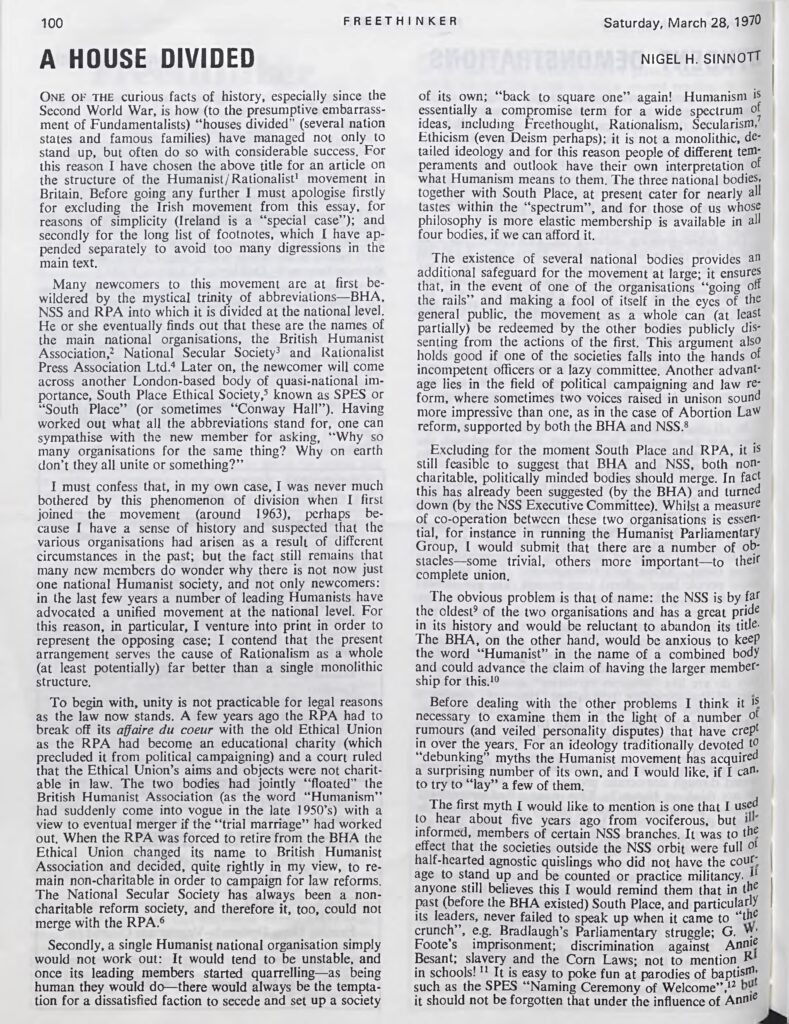
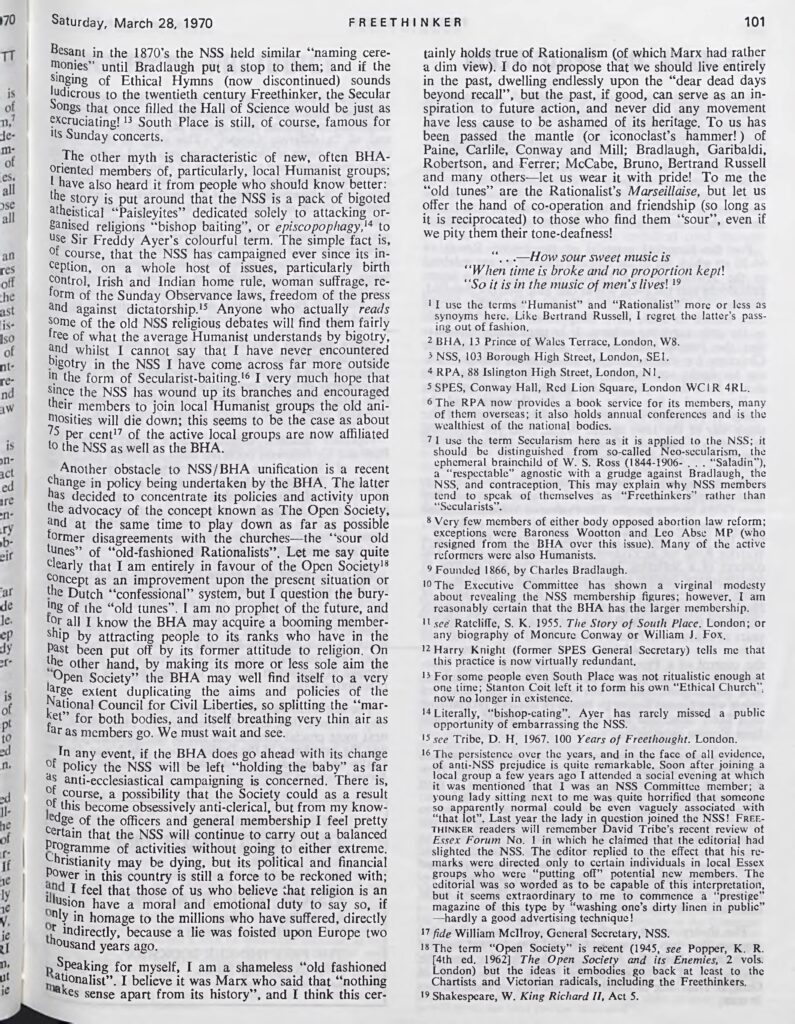
See also:
The Freethinker on the British Humanist Association, 1967
‘Possessed by Not-Quite-Holy-Spirit’
Enjoy this article? Subscribe to our free fortnightly newsletter for the latest updates on freethought.


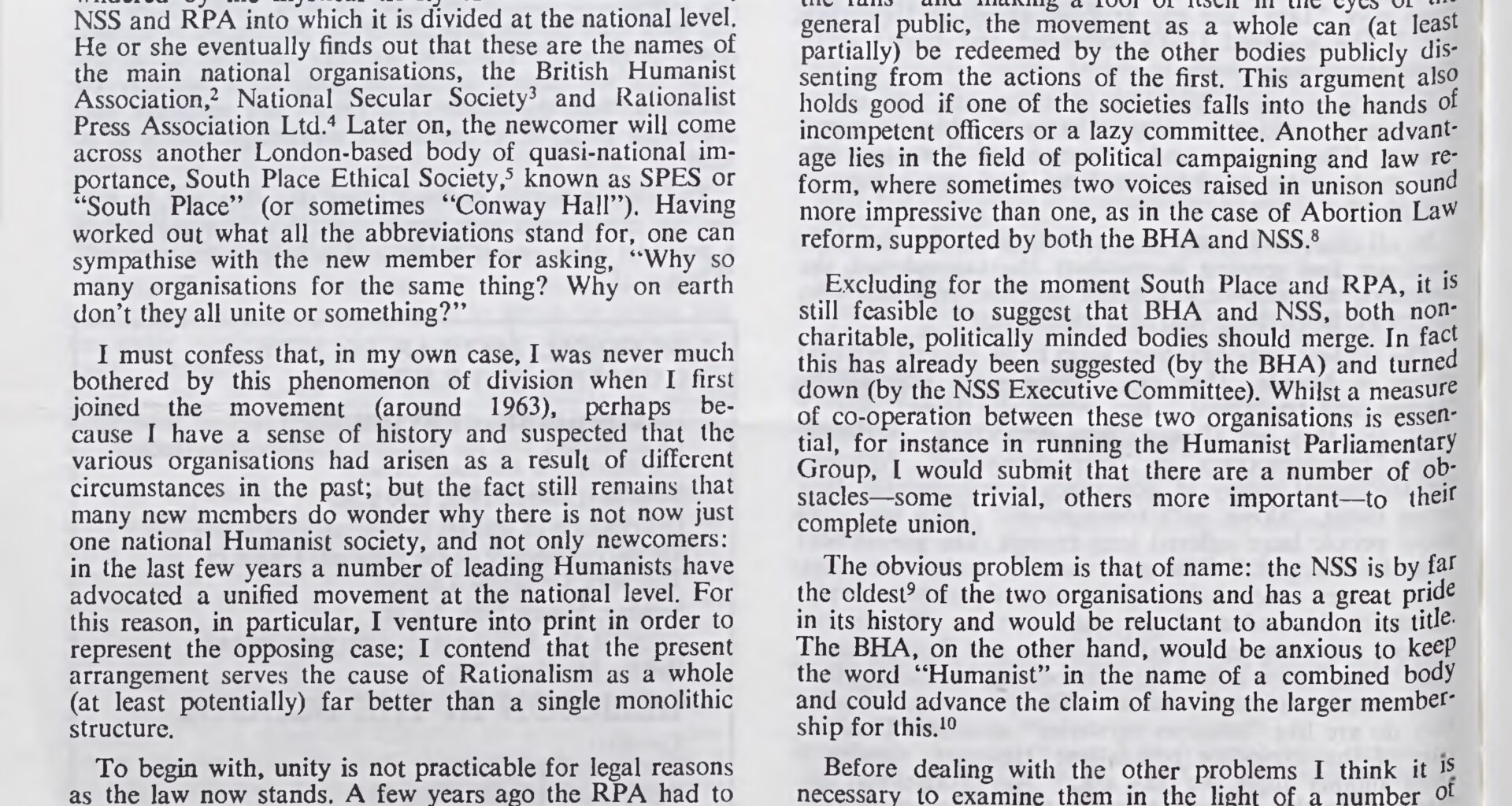

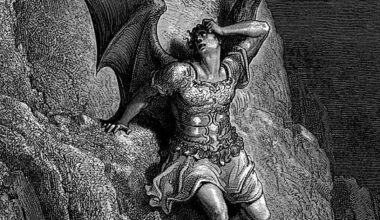
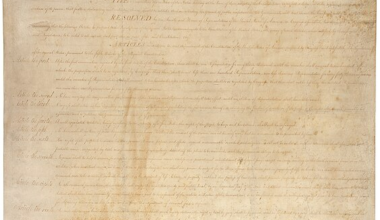

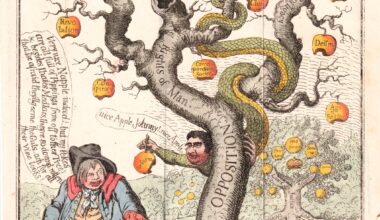

1 comment
Great article, and the comments about the differing aims of the various non religious organisations and the reasons for having separate companies to represent those aims still holds true. What is sad though is the lack of cooperation amongst the various non-religious organisations. I guess that this is because they are competing for the same scarce funding resources (membership and donations, legacies etc). Thanks for re-publishing.
Your email address will not be published. Comments are subject to our Community Guidelines. Required fields are marked *
Donate